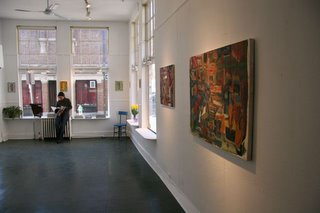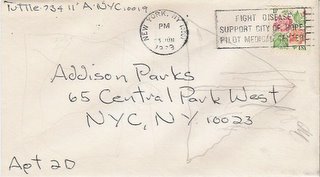
Think about it. Who decides what is well done? Your boss, your parent, your local newspaper critic, your average guy off the street? You may appreciate it when someone else appreciates your thing well done, and everyone likes to be appreciated, but what does it mean? It occurred to me immediately as a child that the obverse of "anything worth doing is worth doing well" was even more true, that anything really worth doing was worth doing badly, or just as well as you could, which may be really badly or who knows. Just as much of a cliche is the Van Gogh tale: but it fits. He loved what he was doing and no one else much cared, until now that is, and you can't get within three feet of his work without a museum guard backing you off. He may be the exception to the rule, but then again, who knows? Who knows is what it is all about. "Who." And "Knows."
There are two answers. You know, and nobody knows. Furthermore, why would you let some other mere mortal dictate your choices. People do, lots of people, all the time, and lots of other people want them to. The words "it is your life" don't occur to them. But it is your life, no matter who you are, and if it occurs to you that something seems worth doing, then by all means it is worth doing no matter how well you do it. In other words, anything worth doing is worth doing badly. If that offends someone else, then that falls into the category of their problem. And they are entitled to that.
Someone asked me yesterday, how do you hang your work out there. How do you keep from being hurt?
Well, I've been showing my work since I was ten in a "professional" context. The older I get, however; the more I embrace amateurism. Not that I don't appreciate a professional dentist or airline pilot, but in the area of the creative, I think it keeps things in a healthier perspective. Professional artists and writers get a little stiff for me.
But back to the question. Well, it is a balance. You have to have a healthy opinion of yourself, perhaps even a high opinion. Of course professionals get a rigid high opinion of themselves that overcompensates for the subjectivity of things. It needs to be balanced, again. Everybody bleeds, everybody gets gas(sorry), and everybody needs to be loved. Everybody. Everybody has an up and a down side. Yin Yang. Make room for your bad self and then you can work on it. Make room for your good self and you can appreciate it. Not too high or too low. I hang my work out there for those who might appreciate it. Do I think it is worthwhile? That is understood. Does anyone else have to think it is worthwhile? No. I may not like that someone thinks I'm a lousy painter, but I would fight for their right to their opinion. Because that is what it is. Opinion. It is not knowledge. No one can know what is good or bad. They just have an opinion. The greatest people in their fields all have their detractors, which is as it should be. You can't take opinions either way. If you do you give up your freedom. Of course this does not mean you can't consider someone else's point of view. Again, that is your choice. But it is just their point of view, and it is skewed thus, and it may or may not work for you even if it works completely for them.
So I take it all with a grain of salt. The good and the bad. I've had people at the top and the bottom go both ways and it was pretty much the same. Take it in stride. Stay close to what makes your motor run and work hard to keep it running. Up and down can take you out of your groove(when does a groove become a rut?). Rudyard Kipling wrote a very wise poem about it(If).
What would I really like to have happen as a result of my work? I'd like people to feel like going there, and I would like them to have a worthwhile time, whatever that is. But they can go on not go, and I'm fine with that. It is the old, you can lead a horse to water thing but you can't make them drink. That is how it is supposed to be. They only drink if they want to. I don't invest too much in their reaction either way. Do I feel like to be appreciated is to be understood. Yes. Would I like it? Yes. But again, I don't let it affect me too much most of the time. Do I hate being ignored. Sometimes, but it goes with the territory. Freedom means responsibility, and if I want the freedom, I have to want the responsibility.
But I'll go back to the beginning. Painting is worth doing to me. I am really into it. Could I be the worst painter on the planet? Of course. I've gotten a thumbs down from my father for most of my life. I didn't let it stop me. Why? I like to paint. I think it is worth doing. Why? I can think of a couple of reasons right off. I like color. I like that it affects me but I don't know why. I like beginnings. I like the blank slate. It is like the bow of a boat with nothing but open water out in front. I like making something. I like mushing paint around and seeing what happens. I like the way paint tells me things and helps me to see things. I like the way it feels. I like being a part of the language of paint, and painting and the history of painting. I like connecting with the first person that ever did a cave painting to tell a story or express a feeling or idea. I like the way you can take it in all at once, that it is spatial, not linear.
Now what about the people who are confused? The people who think that they are empowered, entitled, equipped, enlightened enough to decide how well people are doing what they are doing it and whether they should be doing it at all? There are a lot of these people, and more are being born everyday. What do you say to them? Nothing. They are entitled to their delusions. They are bullies and like any kid knows, the best thing to do is ignore them. Walk away. I spent too much time fighting bullies and I suspect it made me one too. Don't fight. Walk away if you can. What do you do when you see them hurting someone else? Well, I hate to say it, but I still try to stop them if I can. Mostly I feel pity for them, but I believe in protecting and defending the frailer of us. Which is why I went back to teach at RISD. To shepherd the more fragile sensibilities that wanted to be artists. In the end I had to leave them to their fate, however, because RISD is for artists who want to get ahead( I did), and so you get what you deserve. You can't have it both ways. If you want to play with the big boys, it is a rough game, and someone is going to get hurt. If you want to just be an artist, well find somewhere and go do it. You don't need to play the game. If you think doing something is worth doing then do it. If your parent, mate, sibling, teacher, boss, whatever has a problem, again, it is their problem.
So that's what it's about. I do what I do because I think it is worth doing. I hang it out there to make the connection. Either I do or don't connect, but at least I made the first one with myself. For what it's worth, I think painting can be like music or nature, and work its magic whether people are paying attention or not. Do I think it's magic? Yes, to me that is what magic is. And it is worth doing because I think so.
PS It is understood that we are not talking about something that is hurting someone else, I mean REALLY hurting someone else, not just "disappointing" them. You have to know right and wrong. That is understood. Where that line comes into play is something you will have to decide.






